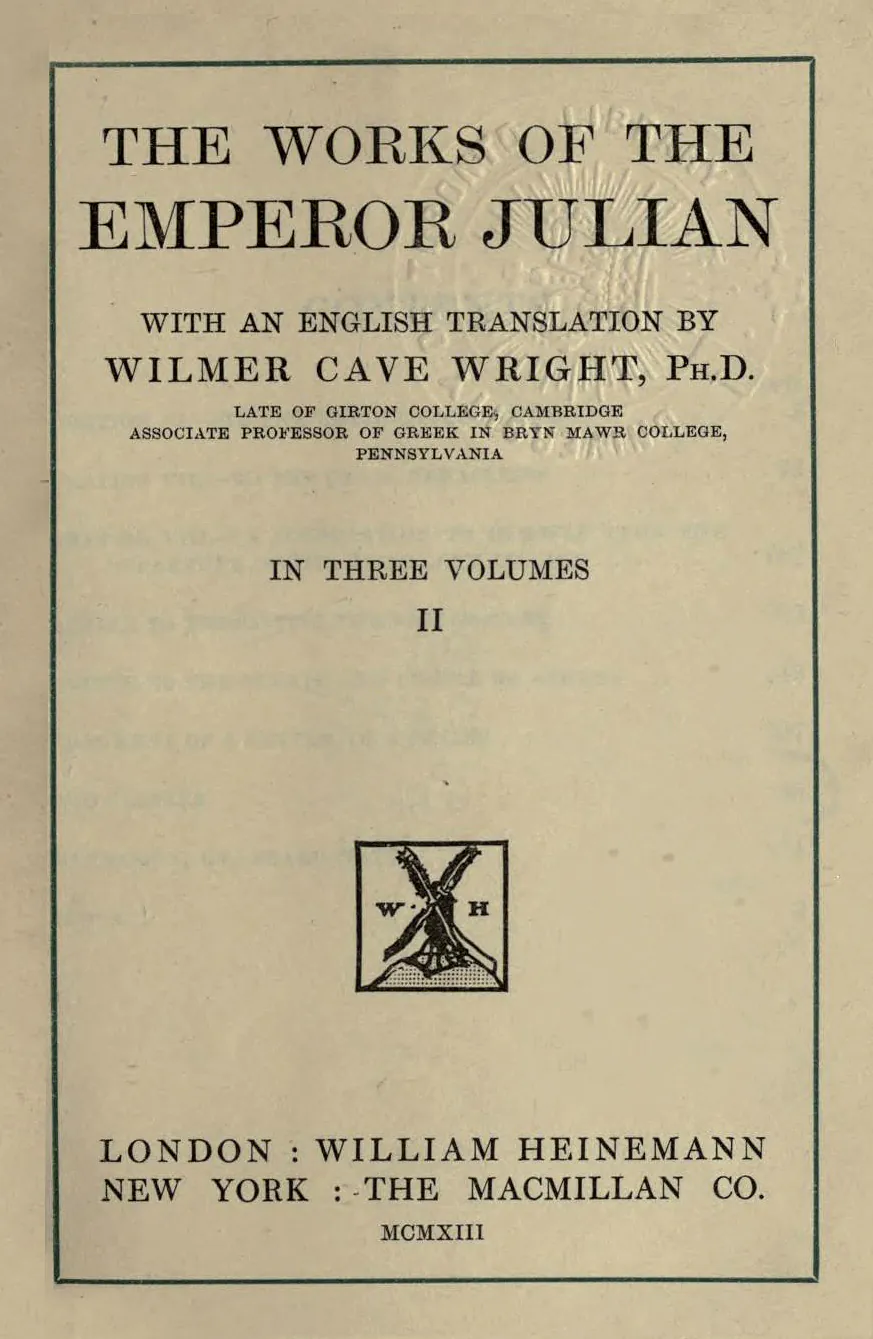[A]
πρέπει δ ̓ οἶμαι τῇ πόλει θύειν ἰδίᾳ καὶ δημοσίᾳ· νυνὶ δὲ ὑμῶν ἕκαστος ἐπιτρέπει μὲν τῇ γυναικὶ πάντα ἐκφέρειν ἔνδοθεν εἰς τοὺς Γαλιλαίους, καὶ τρέφουσαι ἀπὸ τῶν ὑμετέρων ἐκεῖναι τοὺς πένητας πολὺ τῆς ἀθεότητος ἐργάζονται θαῦμα πρὸς τοὺς τῶν τοιούτων δεομένουςλ ἔστι δὲ τοιοῦτον οἶμαι τὸ πλεῖστον τῶν ἀνθρώπων γένος· ὑμεῖς δ ̓ αὐτοὶ πρῶτον μὲν τῶν εἰς τοὺς θεοὺς τιμῶν ἀμελῶς ἔχοντες πράττειν οὐδὲν ἄτοπον ὑπολαμβάνετε·
[B]
πρόσεισι δ ̓ οὐδεὶς τῶν δεομένων τοῖς ἱεροῖς· οὐ γὰρ ἔστιν οἶμαι πόθεν διατραφῇ. καὶ γενέθλια μέν τις ἑστιῶν ἱκανῶς παρασκευάζει δεῖπνον καὶ ἄριστον, ἐπὶ πολυτελῆ τράπεζαν τοὺς φίλους παραλαμβάνων· ἐνιαυσίου δ ̓ ἑορτῆς οὔσης οὐδεὶς ἐκόμισεν ἔλαιον εἰς λύχνον τῷ θεῷ οὐδὲ σπονδὴν οὐδ ̓ ἱερεῖον οὐδὲ λιβανωτόν. ἐγὼ μὲν οὖν1μὲν οὖν Hertlein suggests, μὲν MSS. οὐκ οἶδα, ὅπως ἄν τις ταῦτα
[C]
ἀνὴρ ἀγαθὸς ὁρῶν παρ ̓ ὑμῖν ἀποδέξαιτο, νομίζω δ ̓ ἔγωγε μηδὲ τοῖς θεοῖς ἀρέσκειν.”
Τοιαῦτα εἰπὼν τότε μέμνημαι, καὶ ὁ μὲν θεὸς ἐμαρτύρησέ μου τοῖς λόγοις, ὡς μήποτε ὤφελεν, ἐκλιπὼν τὸ προάστειον, ὃ πολὺν ἐτήρησε χρόνον, ἐν ἐκείνῃ τῇ ζάλῃ τρέψας ἀλλαχοῦ τῶν κρατούντων τὴν διάνοιαν καὶ τὼ χεῖρε βιασάμενος. ὑμῖν δ ̓ ἀπηχθόμην ἐγὼ ποιῶν ἀνοήτως. ἐχρῆν γὰρ σιωπᾶν, ὥσπερ οἶμαι πολλοὶ καὶ ἄλλοι τῶν συνεισελθόντων ἐμοί, καὶ μὴ πολυπραγμονεῖν μηδ ̓ ἐπιτιμᾶν.
[D]
ἀλλ ̓ ὑπὸ προπετείας ἐγὼ καὶ τῆς καταγελάστου κολακείας· οὐ γὰρ δὴ νομιστέον ὑπ ̓ εὐνοίας ἐμοὶ τότε εἰρῆσθαι τοὺς πρὸς ὑμᾶς λόγους, ἀλλ ̓ οἶμαι δόξαν θηρεύων εὐλαβείας τε εἰς τοὺς θεοὺς καὶ εἰς ὑμᾶς εὐνοίας ἀδόλου· τοῦτο δ ̓ ἐστὶν οἶμαι παγγέλοιος κολακεία· πολλὰ ὑμῶν μάτην κατέχεα.
[A]
but it befits the city, I think, to offer both private and public sacrifice. But as it is, every one of you allows his wife to carry everything out of his house to the Galilaeans, and when your wives feed the poor at your expense they inspire a great admiration for godlessness in those who are in need of such bounty – and of such sort are, I think, the great majority of mankind, – while as for yourselves you think that you are doing nothing out of the way when in the first place you are careless of the honours due to the gods,
[B]
and not one of those in need goes near the temples – for there is nothing there, I think, to feed them with – and yet when any one of you gives a birthday feast he provides a dinner and a breakfast without stint and welcomes his friends to a costly table; when, however, the annual festival arrived no one furnished olive oil for a lamp for the god, or a libation, or a beast for sacrifice, or incense.
[C]
Now I do not know how any good man could endure to see such things in your city, and for my part I am sure that it is displeasing to the gods also.”
This is what I remember to have said at the time, and the god bore witness to the truth of my words – would that he had not! – when he forsook your suburb which for so long he had protected, and again during that time of storm and stress2Julian probably alludes to the riot which took place at Antioch on account of the famine in 354, when the populace killed Theophilus the Governor and were punished for the murder by Constantius. when he turned in the wrong direction the minds of those who were then in power and forced their hands. But I acted foolishly in making myself odious to you. For I ought to have remained silent as, I think, did many of those who came here with me, and I ought not to have been meddlesome or found fault.
[D]
But I poured down all these reproaches on your heads to no purpose, owing to my headlong temper and a ridiculous desire to flatter, – for it surely is not to be believed that out of goodwill towards you I spoke those words to you then; but I was, I think, hunting after a reputation for piety towards the gods and for sincere good-will towards you, which is, I think, the most absurd form of flattery.
EN translation: Wilmer Cave Wright, 1913
LEARN MORE
Place your mouse over a term to see corresponding popup from Wikipedia.
ALL PAGES

| Title | London: The Works of the Emperor Julian, Volume II/III |
| Publisher | London: William Heinemann |
| Year | 1913-23 |
| Pages | 416-511 pp. [vol. II: 538 pp.] |
| Translation | Wilmer Cave Wright. PhD |
| Editors | T.E. Page and W.H.D. Rouse |


